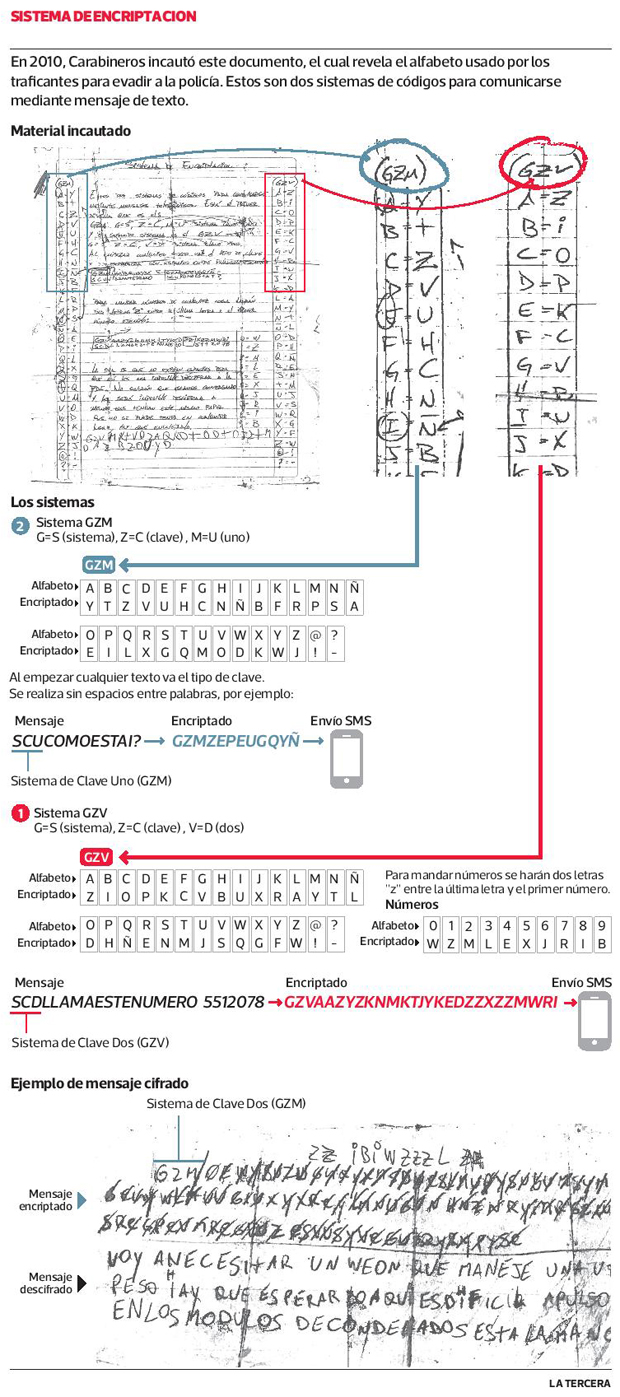
Authorities in Chile have used a secret code belonging to drug dealers to convict a suspect, in a case showing that, while criminal methods are constantly evolving, the most basic techniques can still throw authorities off the trail.
In 2010, Chile’s national police, the Carabineros, arrested Leonardo Yañez Sepulveda with 80 grams of cocaine on his person in Santiago. In his wallet, they found notes that detailed a coded language used by the traffickers to communicate via text message, reported La Tercera. The notes contained a full explanation of how to use the coded alphabet, and how to decipher incoming coded messages (click on La Tercera’s image below to see full-sized original).
The notes state: “The idea is to avoid using spaces, so it will be impossible for the investigative police (PDI) to decipher. They won’t know that we are communicating, and it will be impossible to understand, unless they get ahold of this piece of paper, which you can’t just have anywhere; you have to hide it.”
 Prosecutor Macarena Cañas said that for the authorities who analyzed the note, the find was completely novel. “It’s like the Rosetta Stone; you have a complete dictionary,” he said.
Prosecutor Macarena Cañas said that for the authorities who analyzed the note, the find was completely novel. “It’s like the Rosetta Stone; you have a complete dictionary,” he said.
Four years later, on February 4, 2014, this same code was used to convict Yañez for drug trafficking and sentence him to three years in prison.
InSight Crime Analysis
There are plenty of examples of the ever-changing modalities used by drug traffickers to avoid detection. Trafficking methods can include converting cocaine to liquid form, hiding it in consumable products such as pastries, and having “mules” swallow liquid capsules. Major drug trafficking organizations often use coded language over radios tuned to special frequencies to communicate and track security force movement, and the equipment can be quite sophisticated.
This case in Chile, which evokes thoughts of an old mystery novel, takes things back to basics, illustrating that the simplest strategies can also still be used effectively at the local level. (While the case is not explained in detail, the fact Yañez was carrying only 80 grams of cocaine and received a relatively short sentence suggests he was little more than a street dealer.)
SEE ALSO: Coverage of Chile
It is also noteworthy that Chilean authorities managed to use this code, once they deciphered it, to achieve a conviction. The majority of criminal trials in Latin America continue to be dependent on witness testimony, which can be unreliable or hampered by fear and intimidation, disrupting justice in major cases.
- Chile











